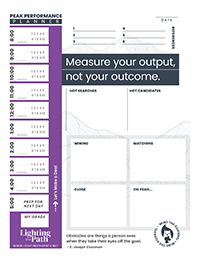Benjamin Zander wrote of an experience with his music instructor in The Art of Possibility. As the conductor of the Boston Philharmonic, Benjamin’s gift for music shaped the musical careers of highly talented and gifted musicians.
As an 11 year old, Ben studied the cello under Mr. Herbert Withers, a spry 83 year old instructor. Struggling the first time, he tried to play a piece and failed; as he did on his second and third attempts. As he dejectedly put down his bow, Mr. Withers leaned over and whispered in his ear, “What? You’ve been practicing for three minutes and you still can’t play it?” We are lucky Ben kept practicing.
The door to the unlimited world of possibility is hinged by the practice of the craft we are trying to master. Over the 20 plus years of leading managers, recruiters and sales professionals I have witnessed countless, highly talented people who chose not to invest time in practice. It seems like a line gets drawn, as if they are saying, “don’t ask me to do something that will challenge my competence.” Yet it is the willingness to study and practice or rehearse that increases performance levels. Too often growth is stymied due to frustration over the lack of immediate mastery. Expectations become short term focused, causing bars to be set too low in an attempt to feel secure in reaching them. The goal should be more than meeting acceptable standards. Our focus should be on attaining excellence, reachable only by investing trial and error along with time to properly hone the skills that truly make a difference.
This approach challenges our responsibility as leaders. Where do we draw the line between perfect and good enough?
- Do I create an atmosphere that encourages error in support of staff development?
A principle of Japanese leadership is allowing people on your team to make decisions even though you believe it will not generate the results you are seeking. More is learned by our errors than our triumphs. Just today, I was discussing a previous presentation with one of my partners where I used language to describe our service group within our IT consulting product line. He stepped in and repositioned my point with the client, giving broader and deeper meaning to our answers. Since then I have applied the principles I learned in that meeting to a number of other situations. Our stumbles are not failures, just signals we need to adjust our footing to better reach our destination. - Have I created a practice mentality on my team or am I simply verifying end results? I realize time is our most valued commodity and the firm that manages it better and more consistently will usually prevail in the long term. Yet it is practice our teams need to get ready to be in the game that allows members to move with more confidence when they reach adversity. Do we encourage and allow practice time to allow performance levels to climb or simply remain stuck in a ‘Just Do It’ atmosphere? Our attitude towards practice will determine how open others are for input and redirection instead of being chastising for not reaching our expectations.
- Have I personally spent enough time in practice to recognize the steps that must be mastered? Today more than ever our team members need our assistance in dissecting operating, accounting, administrative or sales processes. Today’s competitive environment demands more results, provided quickly and accurately. Professionals are being asked to do more with less teammates; smaller environments asked for greater performance.
At the end of the day, Mr. Withers was trying to teach patience; patience to develop, patience to teach, and patience to lead. Think of what the world would have missed had an e11 year old boy decided that the practice wasn’t worth the effort. Practice is normally not fun but we pay a much greater price when we choose not to persist in sharpening our skills.
How do you practice patience in your daily life?





Mike, well said. I need to practice everyday!
Mike, well said. I need to practice everyday!
Thanks, Curt. Are you willing to share what you feel you need to practice? For me, it is practicing the stories I tell on the way to visit a client so that I know the points I will make. As I write this I wonder what the difference is in practicing and preparation.
Thanks, Curt. Are you willing to share what you feel you need to practice? For me, it is practicing the stories I tell on the way to visit a client so that I know the points I will make. As I write this I wonder what the difference is in practicing and preparation.